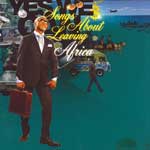The artists themselves have fittingly fractured personal stories. Nigerian rapper Raptuous worked with a German producer called Beige to create the opening track, “Money Talks,” which vividly illustrates the allure of foreign places to those who’ve never been there. The song, made for a Nollywood film, can also be heard as a cautionary tale about the opportunities, uncertainties, and corruptions of the illegal immigration path. Wanlov the Kubolor is a Ghanaian/Romanian who now lives in Ghana after seven years in the US. His song “Green Card,” dramatizes the frustration and grind of winning legal status in the US. Boobah Sidik is Ivoirian, but grew up in Dakar and went to university in California. His immigration status denied him the chance to use his higher learning in the US, so he became a rapper, debuting with an album called “Dead Goats Don’t Fear Knives.” British born Nigerian rapper African Boy revels in exposing the unvarnished chicanery of his resourceful and unscrupulous peers. His song “Lidl” offers the joyful confessions of an illegal immigrant, shoplifting in London. It’s playful, fun, brash, and very compelling.
Most of these tracks are more somber in tone. The Daara J Family’s “Unité 75” (created for this compilation) hones in on the reality of Africans in Europe, facing a whole new slate of challenges and problems, and expected to support folks back home, still entranced by the fiction that escape means wealth and opportunity. The also deals with the pressure immigrants get from those left behind: “Quickly marry a brunette, red-head or blonde bomb, or an old white woman would do…. We are broke, send it by Western Union.” Toronto based Somali rapper K'naan picks up the Western Union thread with his sharp evocation of the dark side of distance, “15 Minutes Away.” K’naan’s complex nuanced emotions span desperation, the shame of subterfuge, and the sweetness of generosity—he notes that now that he’s landed on his feet, he loves to send Western Union missives to others in need. That complexity and K’Naan’s superb word play show why he’s the African rapper with the biggest international profile so far.
Senegal displays its dominant hip hop prowess on this collection. Matador checks in with a very cool sound, funky, ominous, and tricked out with a berimbau riff and horror flick scream keyboards. The raping is hard and edgy, basically a wake-up call to a sleeping public, a catalogue of the challenges and humiliations of the underclass. “If they don’ smoke ganja or drink wine, I don’t know what they’ll do to forget this pain.” Amid crashing waves, and a slow, heavy beat, V.A. Capsi Revolution explore various perspectives on the sea-bound wave of immigrants risking their lives for a chance at settling in Europe. “Immigration Clandestine” begins with the justification for such a move, the idea that immigration is not “a crime like stealing, it’s just taking what belongs to us.” Then the rappers move to explanations, the how and why of people who take to the uncertainty of the seas. And in the end, caution. Leaving is “a suicide mission…giving up on Senegal…we’ve got to…stay home and work hard in Dakar.” The song is a journey in itself. Awadi, the doyen of Senegal’s brave and principled rappers also takes on the water-born exodus. “Sunugaal” refers to the dugout canoes that flowed out of the country in 2006, taking 31,000 over 900 miles to the Canary Islands. Some 7000 died along the way. Awadi puts the blame for all this squarely on Senegal’s corrupt leaders whose actions leave the poor underclass few options. No ambiguity here. The music is brooding and minimalist, with a simple guitar riff at center, light drums, and beautifully layered vocals: “God doesn’t go to the polling booth, it’s the people who vote.”
We get some nice musical variety, updated Cape Verdean funana from Izé, Ivory Coast coupé decalé from DJ Roch, and a little Congo-flavored disco from “sapeur” Martin Pecheur, a Swiss based Cameroonean, who notes, “The white many may have invented clothes, but we turned it into art.” This CD’s excellent sleeve notes contextualize the artists and songs. Best of all, we get the full texts of nearly all the raps, translated from various languages into English. This gives rich insight into the minds and concerns of these artists, and what a difference that makes. African rap frustrates some listeners in a way that African singing does not. It is easier to accept the fact that one has to intuit rather than decipher meaning when one is listening to a compelling vocal melody, but a rapper, spitting words into a microphone with seriousness and purpose demands to be understood. This compilation renders a bold new wave of African artists both understandable and sympathetic.
-Banning Eyre








